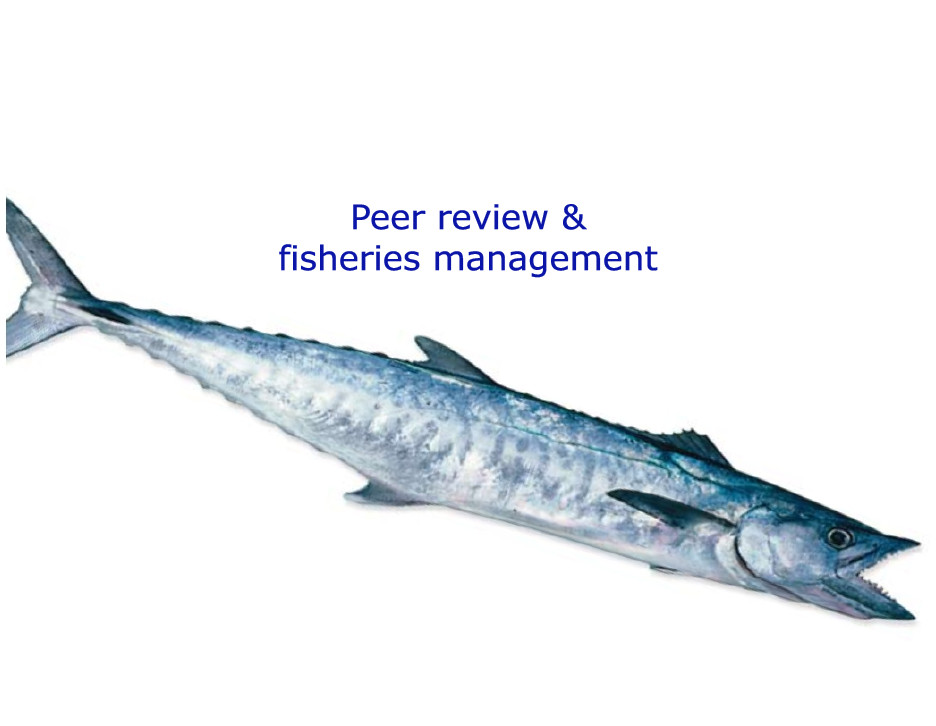Peer Review: The case of the Queensland Spanish Mackerel Fishery

Let’s start this post with defining a key term, peer review. According to Kelly et al. (2019, p. 227) peer review is defined as, ‘a process of subjecting an author’s scholarly work, research or ideas to the scrutiny of others who are experts in the same field. It functions to encourage authors to meet the accepted high standards of their discipline and to control the dissemination of research data to ensure that unwarranted claims, unacceptable interpretations or personal views are not published without prior expert review’ Kelly et al 2019
The Spanish Mackerel (SM) stock assessment (which has not been released to the public) is being peer reviewed and the process is of course being managed by Fisheries Queensland. A contract has been awarded to an individual or organisation tasked to review the SM stock assessment and again we do not know who that individual or organisation is until the peer review is completed.
Then SM fishery working group communique summarised a meeting held between 17 and 18 May 2021. Amongst other statements, the following was published: ‘Fisheries Queensland advised the draft biomass for Spanish mackerel is estimated to be 17% of unfished biomass’ SM Fishery Working Group
So where was the control of information going to the public and industry when the figure was released? If the department’s modelling is an estimate or a draft finding, why not undertake the review process first and open the review to industry and the public for scrutiny once the process has been completed?
The implications for the fishery are not insignificant with one seafood industry business in Cairns indicating a potential $2 million hit in terms of payment to commercial fishers and revenue from sales of SM. Add to this the potential impacts for recreational fishing.
To clarify – we are not saying any decision has been made regarding the so-called management of the fishery but speculation is running wild for a good a reason. One of those ‘good reasons’ is that industry does not trust the science, the process and the modeling used by Fisheries Queensland. This view will be tested once the SM assessment is released for industry and public scrutiny.
I ask you to look at the definition of peer review again… paying for a peer review is not a peer review in the strictest sense of the term.
For more information regarding the SM fishery debacle please read or listen to the following sources:
- QSIA News – Issues with quota management: https://qsia.com.au/2021/06/03/issues-with-the-quota-management/
- QSIA news – Issues with the Queensland Spanish Mackerel Fishery: https://qsia.com.au/2021/06/01/issues-with-the-queensland-spanish-mackerel-fishery/
- QSIA Podcasts – Impacts of mismanagement: A discussion with Stephen Parsons: https://qsia.podbean.com/e/impacts-of-mismanagement-a-discussion-with-stephen-parsons/
- QSIA Podcasts – Fisheries Reform: A discussion with Andrew Mirosch: https://qsia.podbean.com/e/fisheries-reform-a-discussion-with-andrew-mirosch/
- QSIA Podcasts – Issues with the Queensland Spanish Mackerel Fishery: https://qsia.podbean.com/e/issues-with-the-queensland-spanish-mackerel-fishery-part-1/
- QSIA Podcasts – Issues with Quota Management: https://qsia.podbean.com/e/quota/
Author: Shane Snow, QSIA Vice-President and Eric Perez, QSIA CEO.
Image: Annual Status Report 2011 – East Coast Spanish Mackerel Fishery
The content of this post is provided for information purposes only and unless otherwise stated is not formal QSIA policy. The information on these posts are provided on the basis that all persons accessing the information undertake their own responsibility for assessing the relevance and accuracy of it.

